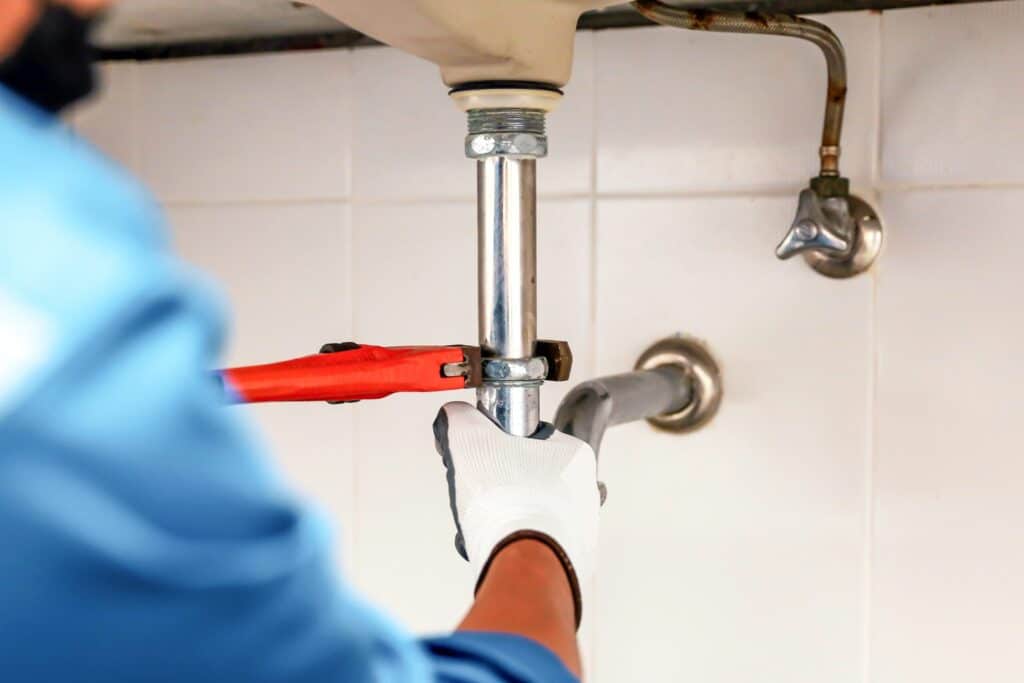Discovering a potential pipe leak in your home can be a massive headache. A leaking or broken pipe, if not handled quickly, can lead to water damage, increased utility bills, and even structural issues. While it’s always best to enlist the help of a professional plumber for pipe leak repair, there are several steps you can take to help mitigate the damage and get your life back in order as quickly as possible.
Common Causes of Pipe Leaks
Knowing why your pipe started leaking in the first place can help you identify potential issues and at least get the leak stopped before a plumber arrives. Some common problems include:
Corrosion: Over time, pipes can corrode due to the water’s chemistry, leading to weak spots and leaks.
High Water Pressure: Too much water pressure strains your pipes, causing them to develop leaks or burst.
Temperature Fluctuations: Rapid temperature changes can cause pipes to expand and contract, weakening their structure.
Clogs: Blockages in pipes can lead to pressure buildup, increasing the likelihood of leaks.
Age: Older pipes are more susceptible to leaks and cracks as they deteriorate over time.
Signs of Water Damage
Knowing the early warning signs of water damage can help prevent extensive issues down the line. Keep an eye out for:
Water Stains: Yellow or brown stains on walls, ceilings, or floors can indicate a hidden leak.
Mold and Mildew: Excessive moisture from leaks can lead to mold.
Peeling Paint or Wallpaper: Moisture can cause paint or wallpaper to bubble or peel off the wall.
Sagging or Warping: Water damage weakens building materials, leading to sagging or warping surfaces.
Immediate Steps to Take
While waiting for plumbing services to arrive, there are steps you can take to get the leak under control:
Turn Off the Water: Find your home’s main water shut-off valve and turn it off, especially if you don’t know where the leak is coming from.
Collect Leaked Water: Place buckets or containers under the leak to prevent further damage.
Open Faucets: To reduce pressure in the pipes, open any faucets connected to the affected line.
Use Temporary Seals: For small leaks, use plumber’s tape or pipe clamps as temporary measures to contain the leak.
Ventilation: Increase airflow around the affected area by opening windows and using fans to prevent mold growth.
Expert Plumbing Repairs
While these temporary steps are helpful, it’s still important to call a plumber for proper pipe leak repair. Experienced plumbers have the skills, tools, and knowledge to locate the leak and fix it properly.
Regular plumbing maintenance can help identify weak points in your system and prevent leaks before they occur. Remember, addressing a small leak swiftly can save you from significant damage and costly repairs in the long run.
If you suspect a pipe leak in your home, don’t hesitate to contact a local plumber. At Essig, we offer efficient and reliable plumbing repair to safeguard your home from water damage and ensure your plumbing system’s integrity. Our team is ready to help with timely solutions to keep your home safe and dry.
While a leaking pipe can be very concerning, immediately contacting a professional makes a big difference. For plumbing repairs and comprehensive plumbing services, contact Essig Plumbing & Heating today. Make it easy. Make it Essig!

